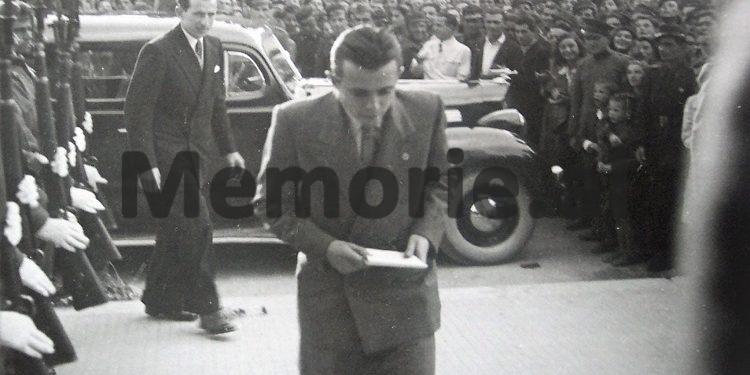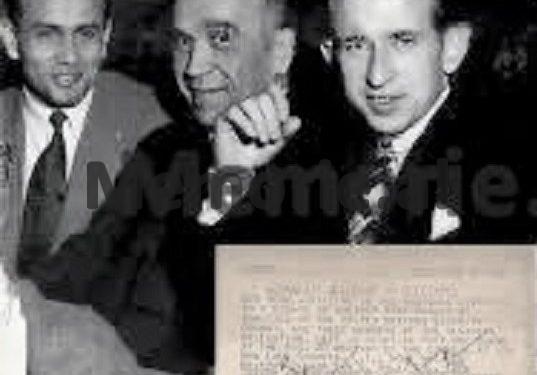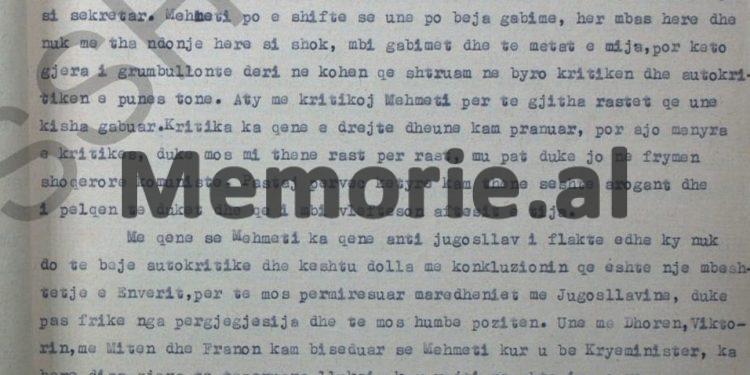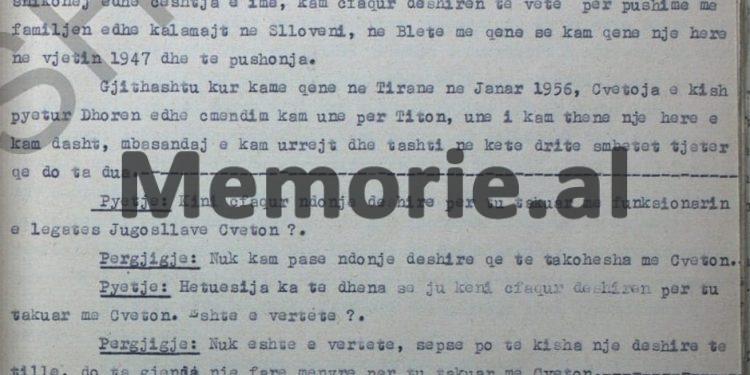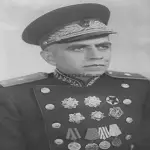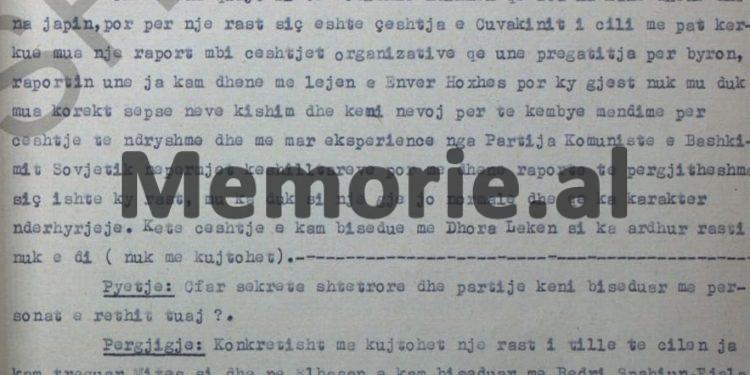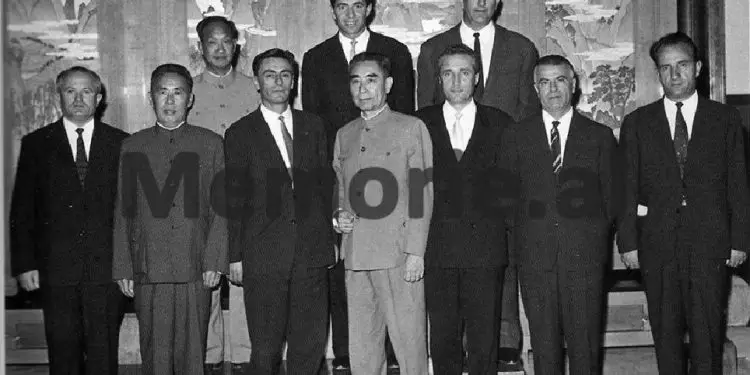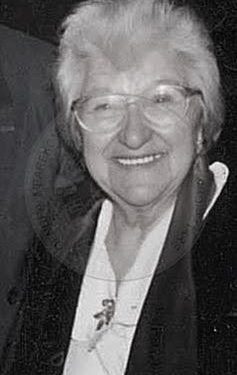Dashnor Kaloçi
Part twenty-four
Memorie.al/ publishes some archival documents issued by the institution of the Authority for Information of Former State Security Files, where there is a voluminous file belonging to Tuk Jakova, who since the period of Zog Monarchy, was one of the leaders of the Communist Group of Shkodra, sentenced to political prison in the famous trial of 1938, together with Qemal Stafa and Vasil Shanton, participant in the founding meeting of the Albanian Communist Party and member of its Central Provisional Committee, since the founding meeting of November 8, 1941, political commissar of the First Assault Brigade and the First Corps of the National Liberation Army, where from the end of the War, in November 1944 until 1955, he held several senior party and state functions and duties. , as: member of the Politburo and secretary of the Central Committee of the Albanian Communist Party, full ambassador of the People’s Republic of Albania in Belgrade, President of the Trade Unions of Albania, Minister of Finance and Deputy Prime Minister of the Albanian government, headed by Enver Hoxha, etc. The entire voluminous file (forms and investigative) that is published for the first time by Memorie.al., Where there are hundreds of unknown documents, in charge of the former lieutenant general Tuk Jakova, (“People’s Hero”), which belong to the period 1951-1959, when he, after numerous contradictions with Enver Hoxha since the end of the war, in 1951 was expelled as a member of the Politburo and in 1955, he was expelled from the Central Committee of PPSh, being dismissed from all party and state functions, which he had held until then, was interned with his family in the district of Berat, where after working for some time as head of the Carpentry Department in that city, in 1957 was sentenced to solitary confinement in Kanina Castle, Vlora district, where he was arrested in 1958, sentenced to 20 years in prison, accused of being a “traitor and enemy of the people”, until he died in the Prison Hospital. of Tirana in 1959, in mysterious circumstances! What is said in the secret documents (reports, photographs, cards, forms, report-information, notes, minutes, surveillance reports, plan-measures, statements, denunciation letters, etc.) belonging to the period 1955-1959, when he was under constant surveillance and surveillance by the State Security bodies, who were the officers of the bodies of the Ministry of Internal Affairs, who were in charge of his surveillance, and the names and nicknames of the Security collaborators, who kept him under strict control. ?!
Continued from the previous issue
Verbal- process
In Tirana, January 23, 1958. We, the investigators of the State Security Directorate, Irfan Shaqiri and the First Captain, Ferhat Matohiti, interrogated the defendant Tuk Jakova.
The questioning started at 8:45 p.m.
The question ended at 14.00
Question: What are the other hostile conversations that took place between you and Dhora Lekë, etc.?
Answer: For Comrade Enver, I said before Dhora Lekë and Viktor Stratobërdhës, that I would not self-criticize the mistakes that, in my opinion, were in our Party, that Enver is used to throwing away these situations, without taking personal responsibilities and I mentioned cases, that Enver had an intimate relationship with Nako, even Nako, ate bread with Enver and when Nako was accused by the Yugoslav leadership, that he tears a strange role in relations with Yugoslavia, Enver here left Nako and went after Koçi.
When the issue later arose that the Yugoslav leadership was on the wrong track and gradually it came to light that the Yugoslav leadership was accused of being an agency of imperialism, Enver withdrew from intimacy with Koçi Xoxe and so, we blamed all the blame on Koçi Xoxe.
After the expulsion of Dhora Lekë and that I had played from the last position, that the Yugoslavs had not entered Albania, i.e., after Tito’s visit to Moscow. When for me there was no basis for Yugoslav intervention in our country, I said that; Enver does not want to be self-critical, because he is afraid of responsibility, because there is no one to blame now.
That Enver supported Pilo Peristeri to bring him to leadership. I told him that Piloja as an old communist could be on the Central Committee and I voted for him to be elected, but he does not have the capacity to be in the leadership. I have said such an opinion in the 1st Plenum that was elected by the 2nd Congress, but this opinion was not called right and I withdrew.
Regarding Mehmet, I told Dhorë that; I had frictions during the War when I was in the Brigade. Our impression is that he has a nature to go to extremes and this is exactly the reason for the frictions we have had. For this I have criticized Mehmet in the basic organization of the headquarters and he was disappointed by this criticism, as my wife, Fiqretja told me. However, I have valued Mehmet as a talented fighter in the leadership of combat formations, that is so true, when in the VIII plenum where Nakoja was defeated, along with Mehmet, who was then in the General Staff.
I have expressed my opinion to Enver and Koci, although Mehmeti has these mistakes, which we called then, we should not have dismissed him from the post of Chief of Staff, because as a military man, he is good. While I, had such views about Mehmet and had not held any resentment from what we had during the War, he on his part, I had the impression that he held some resentment towards me and I explained this with the fact of the form of the first blow when I was removed from office as secretary.
Mehmet was seeing that I was making mistakes, from time to time, and he never told me as a friend, about my mistakes and shortcomings. But he collected these things until the time we submitted to the Bureau the criticism and self-criticism of our work. There Mehmeti criticized me for all the cases I was wrong. The criticism has been fair and I have accepted. But that way of criticizing, not telling me on a case-by-case basis, seemed to me not in the spirit of communist society. Then besides these, I said; that he is arrogant and likes to look and that they overestimated his abilities.
Since Mehmet was an ardent anti-Yugoslav, he too would not be self-critical and so I came to the conclusion that he is a supporter of Enver, not to improve relations with Yugoslavia, fearing responsibility and not losing position. I talked to Dhorë, Viktor, Mita and Frano that Mehmeti, when he became prime minister, did some extravagant things in luxury, when he went to his new house, which used to be the House of the Politburo.
I told Dhorë, Mita, Franos and Viktor that Liri Belishova’s gesture to expel Mita from the party is a gesture of beys. As for Spiro Kolekë, although very conscientious at work, but he was very bureaucratic, but about the bureaucracy of his work, I talked to Dhorë, Mita, even if I told Viktor, I do not remember here.
Question: What did you say against Comrade Enver?
Answer: I, Tuku, talked to Viktor Stratobërdha, Dhorë and Franon, that; Enver is a demagogue and cunning. I said this because I had come to the conclusion that he does not want to be self-critical, that he wants to put personal interests above general interests. I have told the above persons that the expulsion from the party of people who expressed anti-party views, which I called right at the time, is a crime that is being committed, in connection with the measures that were taken, because I did not know from there after playing behind the scenes.
Even Kici Doda, I told him that; these measures taken against some elements in the Tirana Conference, is a crime. I told Dhora Leka when the relations I trusted would be fixed, because the Soviet Union would intervene in this, in addition to improving my case, I expressed my desire for a vacation with my family and children in Slovenia. , in Bleta, since I was once in 1947, and to rest.
Also when I was in Tirana, in January 1956, Cvetoja had asked Dhorë what I thought of Tito, I told him once I loved him, then I hated him and now in this light, no it remains another that I will love.
Question: Have you ever expressed a desire to meet with a Yugoslav official, Cveto?
Answer: I never had the desire to meet Cveton.
Question: The investigator has evidence that you have expressed a desire to meet with Cveton. It’s true?
Answer: It is not true, because if I had such a desire, I would find some way to meet Cveton.
Question: The convict Dhora Leka, in the process of January 22, 1958, testifies, as follows: “Tuku in Berat told me that he was worried that he did not meet with Cveton”! Is the above deposition true?
Answer: It is not true that Dhorë’s deposition left me worried about meeting Cveton, as I did not regret my refusal to meet with him.
Question: What was your attitude towards the decision taken by the Party and the Government to separate the Catholic Clergy from the Pope?
Answer: At first, I did not know how this issue was resolved in other socialist countries, I had the impression that we are not making a political mistake, as the Catholic Clergy here considered the connection with the Pope as a matter of dogma, but when they have accepting the decision of the government, I am convinced that the issue can be resolved even so, that is, without ties to the Pope and I wanted it, that the issue be resolved in the interest of our government.
I discussed this issue with Dhorë, to whom I told how I thought when this issue was discussed, but I did not express opposing views, or I was in opposition to this decision.
Question: What was your attitude towards the Soviet advisers in our country?
Answer: My attitude towards Soviet advisers has been favorable. I have called useful, the help they have given us and give us, but for one case, such as the case of Chuvakin, who asked me for a report on the organizational issues that I was preparing for the Bureau, the report I I gave with the permission of Enver Hoxha.
But this gesture did not seem correct to me, because we had and need to exchange opinions, on various issues and gain experience from the Communist Party of the Soviet Union, but gave me reports, as was the case, m ‘ it seemed to them as an abnormal thing and that has the character of intervention. I talked about this issue with Dhorë, I do not remember how the case came…!
Question: What state and party secrets have you talked to people in your district?
Answer: I specifically remember such a case, which I told Mita, and in Elbasan I talked to Bedri Spahiu. It is about a letter that a communist from Moscow had addressed to the Central Committee, regarding Comrade Mehmet Shehu.
I do not remember talking to Dhorë, because I remember when I told Mita, I told her not to tell Dhorë. While Bedriu in Elbasan, told me that Enver Hoxha on this occasion, could lower the nose of Mehmet Shehu, who had raised it a lot. Memorie.al
Defendant Investigators
Tuk Jakova Irfan Shaqiri and 1st Captain Ferhat Matohiti
The next issue follows




